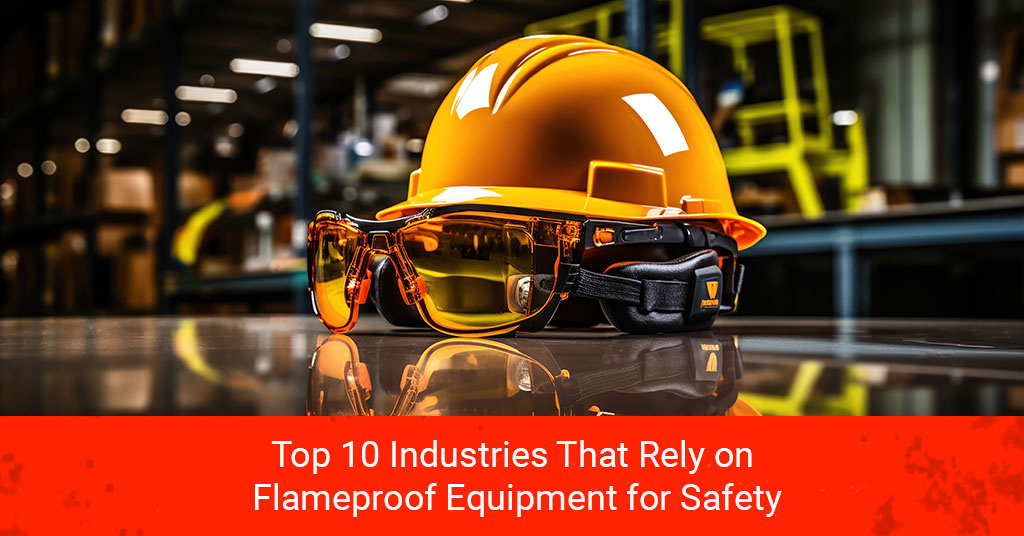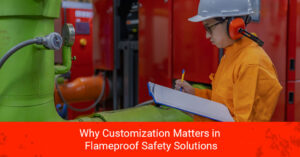The author of this blog, Ramdas, is an industrial expertise writer who is a part of Industrial Safety & Protection Equipment. He has done extensive research to bring the facts about safety and fireproof materials to help out the readers.
Industries facing fire and explosion risks heavily rely on flameproof equipment for safety. These Industries work with gases, vapours, and even dust that can catch fire if the conditions are favourable. To eliminate such possibilities, companies are equipped with flameproof electrical equipment as well as flameproof switches, among many other tools. This article takes a look at ten industries that are reliant on flameproof equipment to ensure their safety.
1. Oil and Gas Industry
The oil and gas industry is one of the most sensitive industries to fire and explosion. A single spark has the potential to cause huge explosions. For proper safety measures, refineries, drilling rigs, and gas processing plants use a flameproof switch, a flameproof rotary switch, and a flameproof emergency light in hazardous zones.
2. Chemical and Pharmaceutical Industry
Chemical plants deal with Compounds that are volatile and ignite easily. Therefore, implementing flameproof electrical equipment and flameproof glands provides an extra layer of safety. These tools are extremely important in production chambers, storage rooms, as well as labs.
3. Mining Industry
Mines contain explosive gases such as methane, which pose the threat of deadly detonations. Workers underground are protected by a flameproof torchlight, an explosion-proof control panel and flameproof limit switches. These devices promote the safety of miners operating in claustrophobic and extremely dangerous areas.
For more safety solutions, explore our flameproof lights for enhanced protection in hazardous environments.
4. Power Plants
Dust and heat are produced by coal-fired power plants and thermal power plants, which pose a risk of explosions. To minimise the risks, power stations utilise flameproof emergency lights, switches, and rotary switches in high-risk areas.
5. Food Processing Industry
Producing food might not sound as dangerous as other industries, but fine powdery particles like flour and sugar can form an airborne explosive. Sealed electrical systems and other flameproof equipment aid in the elimination of chances of sparks that would trigger the dust.
6. Aerospace Industry
The crafting and servicing of commercial aircraft utilises combustible materials. There are many sources of fire, and to control them, there is flameproof equipment in fuel stores, flameproof apparatus in the labs, and blast-proof lights in the equipment rooms.
7. Fertilizer and Pesticide Industry
The production of fertilisers and pesticides uses a lot of volatile reagents, and even a tiny spark can cause dangerous blasts. Flameproof limit switch and flameproof emergency light enable the elimination of shards, putting the lives of many workers at the forefront.
8. Paint and Coating Industry
When paints, lacquer, and solvents are used, flammable vapours are produced and can easily catch on fire when in contact with sparks. Flameproof switches, rotary switches, and sealed electrical panels are used to reduce accidents in paint booths and storage spaces.
9. Steel and Metal Processing
Steel and metal industries are highly dangerous as they use molten metals and gases; these are extremely dangerous and can lead to fires. Flameproof electrical equipment and flameproof torch lights ensure safety in foundries and processing plants.
10. Paper and Pulp Industry
Explosion hazards are present in paper and pulp industries because paper mills produce fine dust. If the fine dust is ignited, it can lead to explosions, which will severely injure a lot of people. To avoid such situations, explosion-proof control stations and electric motors can be used.
Check out our blog on selecting explosion-proof lighting for more insights.
Key Equipment Used in Hazardous Industries
As with any industry, equipment which caters to safety and offers protection from flame and fires includes:
- Flameproof electrical equipment – Prevents sparks in high-risk areas.
- Flameproof switch and flameproof rotary switch – Used for safe electrical control.
- Flameproof emergency light – Ensures visibility during power failures.
- Flameproof torch light – Provides portable lighting in hazardous zones.
- Flameproof glands – Protect electrical wiring from exposure to flammable substances.
- Flameproof limit switch – Helps in automation while preventing ignition risks.
Discover our Flameproof Panel solutions—engineered for unmatched safety and reliable electrical control in the most hazardous environments.
Benefits of Flameproof Equipment
Using flameproof equipment offers several advantages:
- Prevents explosions – Reduces the risk of fire hazards in high-risk environments.
- Ensures worker safety – Minimizes accidents and injuries.
- Increases equipment lifespan – Protects devices from damage in harsh conditions.
- Improves regulatory compliance – Helps industries meet safety standards.
- Reduces downtime – Prevents accidents that could halt production.
You may also like our detailed blog on: Best Practices For Preventing Explosions In Hazardous Areas
Conclusion
Flameproof machinery and equipment are pivotal for industries that are prone to fire and explosion risks. From oil and gas refineries to food processing plants, businesses depend on known companies like Bharat Flameproof for electrical equipment, flameproof electrical switches, and other safety devices to mitigate risks. It is a known fact that investing in the correct safety tools always guarantees worker safety, but it serves a greater purpose by ensuring seamless business operation.
FAQs
Flameproof equipment is designed to prevent sparks from igniting flammable substances in hazardous environments.
It is commonly used in oil and gas, chemical, mining, power plants, and other high-risk industries.
A flameproof switch is enclosed in a protective casing that prevents sparks from escaping, reducing the risk of explosions.
Flameproof glands secure cables and prevent electrical sparks from igniting surrounding gases or dust.
Both terms refer to equipment that prevents ignition, but “flameproof” is commonly used in Indian and British standards, while “explosion-proof” is used in American standards.








